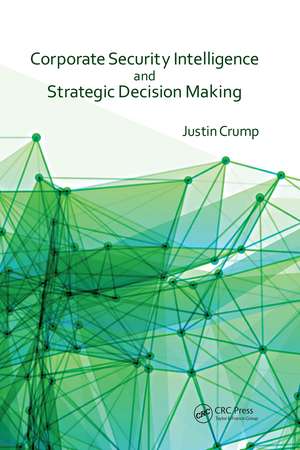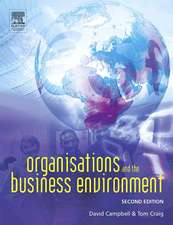Corporate Security Intelligence and Strategic Decision Making
Autor Justin Crumpen Limba Engleză Hardback – 28 apr 2015
The main areas covered include how intelligence in the corporate security environment relates to strategic decision-making; the factors that drive the requirement for corporate security intelligence, as well as the main legislative and ethical imperatives; and how intelligence-led processes can not only prevent loss but also support business growth and revenue generation. Detailed topics include:
- Fundamental and theoretical ideas underlying intelligence work in the public and private sector
- The collection, validation, collation, and analysis of intelligence
- The effective and safe dissemination of intelligence material and the different reporting formats available
- The use of operational models to help guide structures, processes, and the deployment of resources
- How to implement an effective intelligence function in a corporate environment
Preț: 1049.39 lei
Preț vechi: 1311.74 lei
-20% Nou
Puncte Express: 1574
Preț estimativ în valută:
200.81€ • 214.73$ • 167.42£
200.81€ • 214.73$ • 167.42£
Carte tipărită la comandă
Livrare economică 18 aprilie-02 mai
Preluare comenzi: 021 569.72.76
Specificații
ISBN-13: 9781466592704
ISBN-10: 1466592702
Pagini: 300
Ilustrații: 26 black & white illustrations, 6 black & white tables
Dimensiuni: 156 x 234 x 14 mm
Greutate: 0.57 kg
Ediția:1
Editura: Taylor & Francis
Colecția CRC Press
Locul publicării:Oxford, United Kingdom
ISBN-10: 1466592702
Pagini: 300
Ilustrații: 26 black & white illustrations, 6 black & white tables
Dimensiuni: 156 x 234 x 14 mm
Greutate: 0.57 kg
Ediția:1
Editura: Taylor & Francis
Colecția CRC Press
Locul publicării:Oxford, United Kingdom
Public țintă
Professional Practice & DevelopmentCuprins
Rationale. What Is Corporate Security Intelligence? The Corporate Security Operating Environment. Legal Drivers for Corporate Security Intelligence. Operational Drivers for Corporate Security Intelligence. Theory. The Fundamentals of Intelligence. Management and Direction. Intelligence Collection. Collation. Analysis. Dissemination. Practice. Operational Models. Implementing the Function: The Intelligence Estimate. Corporate Security Intelligence Use Cases and Examples. Conclusion: Reinforcing Intelligent Security. References. Index.
Notă biografică
Justin Crump is an intelligence, security and defense expert with seventeen years’ service in the British Armed Forces and government, including operational experience in the Balkans, Iraq and Afghanistan. His corporate career saw him work as first as an investment banker and then as a director of a private intelligence firm. This combined experience eventually led to him founding his own successful analytical company, Sibylline Ltd, in 2010. He is a recognized commentator on world affairs, particularly regarding Islamist terrorism and the underlying theology, and is regularly consulted by international broadcast media. In demand as a speaker at conferences and events worldwide, he is also an expert on the design and delivery of training on emerging security and intelligence topics.
Recenzii
"I am delighted that Justin Crump has decided to produce this timely work on Corporate Security Intelligence. I recommend it to all professionals in the field of security and risk, and to all stakeholders, especially key corporate decision makers. Most especially, I recommend it to all whom hither to ‘have not got it’. Given the world today, it is about time they did!"
—David Burrill OBE, former Deputy Director Intelligence Corps and Chief of Staff of the Intelligence and Security Centre, UK Armed Forces, from the Foreword
—David Burrill OBE, former Deputy Director Intelligence Corps and Chief of Staff of the Intelligence and Security Centre, UK Armed Forces, from the Foreword
Descriere
Despite a clear and compelling need for an intelligence-led approach to security, operational, and reputational risks, the subject of corporate security intelligence remains poorly understood. An effective intelligence process can directly support and positively impact operational activity and associated decision-making and can even be used to drive the firm’s business in key markets. This volume outlines theory and supplies practical solutions to implementing an effective intelligence process in the commercial environment. While the book focuses on corporate security as the natural home of intelligence, the tools and techniques outlined are equally applicable for any decision-support process.























